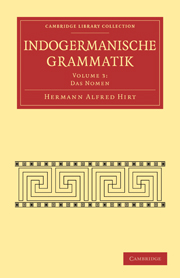Book contents
- Frontmatter
- Vorwort
- Contents
- Einleitung
- I Die Interjektionen
- II Die Partikeln
- III Die Fürwörter. Pronomina
- IV Das Nomen und seine Flexiou
- V Suffix- und Kasusbildung. Die Determinativa
- VI Die Entstehung der Flexion
- VII Die Sufflxbildung. Suffixe aus selbständigen Worten und sonstige Suffixe
- VIII Suffixe durch falsche Abstraktion
- IX Die Wurzeldeterminativa
- X Die Adjektiva
- XI Die Steigerung
- XII Die Adverbia
- XII Die Zahlwörter
- XIV Das grammatische Geschlecht
- Autorenverzeichnis
- Sachverzeichnis
- Wörterverzeichnis
- Berichtigungen
- Frontmatter
- Vorwort
- Contents
- Einleitung
- I Die Interjektionen
- II Die Partikeln
- III Die Fürwörter. Pronomina
- IV Das Nomen und seine Flexiou
- V Suffix- und Kasusbildung. Die Determinativa
- VI Die Entstehung der Flexion
- VII Die Sufflxbildung. Suffixe aus selbständigen Worten und sonstige Suffixe
- VIII Suffixe durch falsche Abstraktion
- IX Die Wurzeldeterminativa
- X Die Adjektiva
- XI Die Steigerung
- XII Die Adverbia
- XII Die Zahlwörter
- XIV Das grammatische Geschlecht
- Autorenverzeichnis
- Sachverzeichnis
- Wörterverzeichnis
- Berichtigungen
Summary
1. Allgemeines. Die indogerm. Sprachen sind gekennzeichnet durch die Flexion und weiter durch den Unterschied von Nomen und Verbum. Beide Eigentümlichkeiten finden sich durchaus nicht bei allen Sprachen.) Es gibt neben den flektierenden sogenannte agglutinierende, flexionslose und schließlich noch andere Arten von Sprachen. Die Kategorie des Verbums ist selbst hochentwickelten Sprachen unbekannt. Es besteht vielfach nur ein Nomen. Demnach dürfte sich das Verbum, das Zeitwort, erst entwickelt haben, und zwar, wie man annehmen darf, aus dem Nomen. Im Idg. zeigen sich zwischen Nomen und Verbum mancherlei äußere Berührungspunkte, und es gibt auch Kategorien, die zwischen beiden die Mitte halten, nämlich Infinitive und Partizipien, die man das Verbum infinitum nennt. Diese sind ihrer Herkunft nach Nomina, nehmen aber in einigen Punkten an der Natur des Verbums teil, so an dem Unterschied der Zeitstufe, des Genus Verbi und der Konstruktion. Wir können verfolgen, wie sich dies vor unsern Augen erst entwickelt hat.
Daß die Flexion ein besonders hoher oder gar der höchste Stand der Sprachentwicklung sei, ist früher vielfach behauptet worden, das ist aber durchaus zweifelhaft, und man tut gut, sich in diesen Fragen der Werturteile zu enthalten.
2. Das Verbum bildet im Idg. eine wohl gekennzeichnete Sprachkategorie. Wir finden bei ihm, wenn auch nicht durchweg, die sog. Personalendungen, die aber das grammatische Geschlecht nicht unterscheiden, die Tempus- und Aktionsbezeichnung sowie das Genus Verbi, d. h. Aktivum und Medium oder auch Passivum.
- Type
- Chapter
- Information
- Indogermanische Grammatik , pp. 1 - 4Publisher: Cambridge University PressPrint publication year: 2009First published in: 1927



